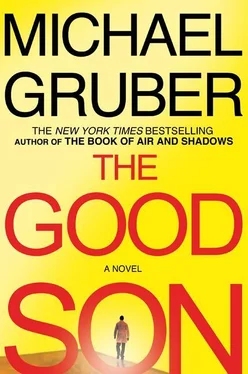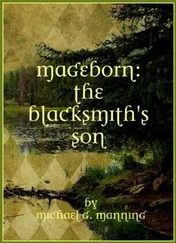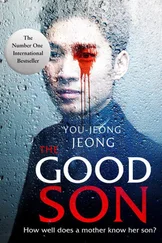Sonia chants without thinking, listening to the breath of God; the sound fills her, it removes the pain of her wounds, it banishes her fear-or not really, she thinks, looking back at herself as from a great distance, it’s more like the pain is still there, but the being, the poor nafs, that feels it, the horrible person who behaved so badly to Farid and Theo and Wazir, who suffered under the whip and the rats and merited that torture, is not the real person.
I will never be able to explain this to anyone, she thinks, as Ismail was never able to explain it to me. I thought it was a trick to be learned, like legerdemain, but it’s not. It’s a grace. How peculiar not to have known it all along, although, now that she thinks of it, she did know it all along, but the nafs cast a cloud between her soul and the knowing, for it did not want to die.
The sound is still in her ears when the trapdoor swings open, letting in a flood of light and the guard, Mahmoud. She continues with the beads and smiles at Mahmoud. She realizes she can see the real person in him too, the image of his Maker, and she can also see, like an encrusting leprosy, the structure of pride, greed, lust, and folly that controls the man Mahmoud in the alam-e-nasuf. She climbs the ladder effortlessly, or so it seems, she feels like she floats on the rungs. Mahmoud seems taken aback now; he was expecting a cowed and beaten woman-the only sort of woman he has ever known, in fact-and now he sees something quite different and he is frightened, Sonia can see his fear, like worms roiling the shadows behind his eyes.
It is the time of Fajr, the dawn prayer. She is brought to the same wide place before the mosque, the same crowd of turbaned men are there, having just finished praising the Compassionate One and looking forward to seeing a woman tortured. Above, the sky is still pink, shading to the palest possible blue. Sonia is still handling her beads. She notices that the men have seen this, and there are murmurs. The mullah stands out of the crowd and gives a speech, in which he again describes Sonia’s blasphemy and offers her a chance to confess. She answers in a loud but mild voice, as if explaining something to a child, that she has not been judged according to the sharia and therefore it is haram for her to be punished. She quotes the Qur’an on the wages of injustice.
The mullah shouts at her, although he does not quote from the Qur’an. Like most village mullahs he is an ignoramus on the subjects of sharia and Islamic theology, substituting a crude bullying style for both. Some men drag out a heavy wooden chair. Sonia is made to sit on the ground. Her legs are tied together and her ankles are lashed to the slats of the chair back. She is as modest now as could be wished. Mahmoud does this work and he is clumsy doing it, so she offers a word of encouragement.
“Mahmoud Saiyed, I forgive you your crime. In Hell you will be repaid for this, but although your feet will be lashed with red-hot wires forever, but I will look down from Paradise and beg the demon to temper the strokes.”
Mahmoud is not quite trembling now, but he looks ill at ease. He takes up his bamboo cane and whisks it back and forth a few times, perhaps to pump himself up.
Sonia fingers her beads and increases the volume of her chanting. The praise of God echoes from the low buildings. The lash descends.
Sonia feels the agony and her body records the damage but it does not reach who she is now. The nafs suffers but she is no longer it. She shouts “Haram!” and continues her chanting Sufi prayer.
Another stroke, although this one seems to spend much of its force on the seat of the chair.
“Haram!”
The mullah calls out for Sonia to be gagged. This is done, with rags. A new murmur floats through the crowd. It is a grave sin in Islam to silence prayer.
On the next stroke a voice floats out past the shutters of a house, a woman’s voice: “Haram!”
On the next stroke, there are more voices from the hidden, a chorus of voices, and the chilling ululation, a sound like the insanity of all the birds. Forbidden! Shame!
This is now the nightmare of the Pashtun male. The women are out of control and it is the women who have the honor of the men in their hands. The women know everything. They know who likes to fuck boys, and who is a drunk, and who can’t get it up in the marriage bed, and for this reason they can never be allowed to escape the iron grip of the men.
Now, almost as one, the men trot off to their homes, including the mullah, who has two wives and a boy. Sonia thinks they will beat all the women now, but not very hard. She is left alone on the dusty street with poor Mahmoud, who looks like he is going to cry.
“It is over, Mahmoud,” she says. “Untie me and carry me back to my room in the hujra. You have been saved from Hell today; God has been merciful to you. And when you have done that, I will interpret your dream for you.”
Mahmoud carries her toward the hujra, but on the way he is stopped by two armed men with the look of seasoned mujahideen. There is a brief argument. The men don’t want her returned to her prison; someone wants to see her. For the first time she hears the name Alakazai and it seems to be a significant one, for on hearing it Mahmoud stops arguing and follows the men. They go down several streets, the roar of the diesel generator grows louder as they walk. They go through a gate in a high mud wall and enter a house. Mahmoud is dismissed, protesting, at the door, and Sonia is forced to hobble on the edges of her feet, following the men, who make no effort to help her.
One of them grabs her arm and hustles her through an open door and into a small room with a high window. In it there are two charpoys and a low table, upon which is a tray with a tea service and a covered basket from which issues the smell of fresh naan. On one of the charpoys sits a man. Sonia collapses on the other. The guard goes to a corner and squats down with his rifle across his knees.
The man on the other charpoy indicates the tea with a flick of his hand.
“Would you like some tea, Mrs. Laghari?” he says in English.
“Yes, thank you,” Sonia answers, and pours. To her surprise it is not the strong milky tea of the region but some herbal brew, flowery, like chamomile or jasmine. But it is hot and she drinks a whole cup and eats a piece of bread. The man watches her and she returns the favor.
He is a comfortably padded man, broad-shouldered, with a tan face and a neatly trimmed dark beard. His ethnic origins are not at once clear, for he has the hawk nose and the hazel eyes common among the Pashtuns, but his air of comfortable self-assurance, relaxed, faintly amused, is one she associates with the plains to the south. And there is something wrong about him, a cast of ill health; the whites of his eyes are yellowish, and there is a faint unpleasant odor in the room. That’s why the herbal tea. The man’s innards are not right.
“How are your feet?” he asks, after she has drunk the tea.
“How do you think?”
He shrugs. “That was a clever ploy. You almost started a riot there, among the women. Idris is very angry with you.”
“It wasn’t a ploy. I was perfectly sincere.”
“Were you?” A look of amusement here. “You consider yourself a Muslim?”
“I am as much a Muslim as you are.”
“Even though you wander around without your husband, unveiled? Even though you are an infamous blasphemer and apostate?” He sips his tea, not taking his eyes off her. “You know, I saw you on television. It was quite a per for mance. I thought you seemed more an ally of our jihad than not.”
“Really. Then you couldn’t have been listening to what I said.”
“Oh, I listened. And I was intrigued. Who was this American who spoke perfect Urdu and had such interesting ideas? Why had I never heard of her before? So I made inquiries, and of course I quickly learned that I had heard of her before; the whole umma had heard of her. And I was amazed that this Sonia Bailey would have the arrogance to lead a party of spies into a Muslim country.”
Читать дальше












